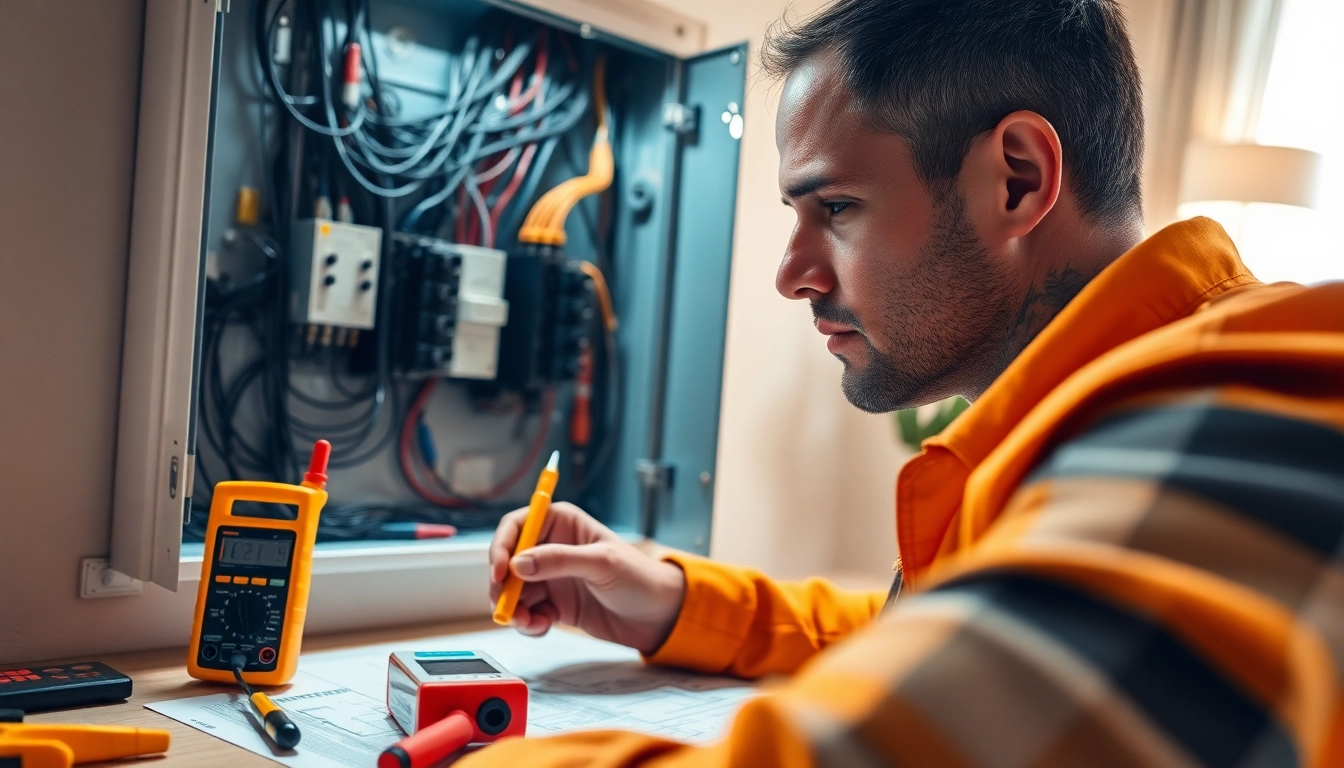
Why Upgrading Your Electrical Panel Clearwater Matters
Upgrading your electrical panel is not merely a suggestion; it’s a necessity for homeowners in Clearwater aiming to ensure safety and optimize performance in their electrical systems. An outdated panel can lead to numerous safety hazards, inefficient energy usage, and even regulatory compliance issues. When you are dealing with the critical lifelines of your home, such as electrical wiring, it is vital to prioritize modern solutions. More information can be found regarding the timing and process of an upgrade, especially emphasizing Electrical Panel Clearwater.
The Safety Benefits of Modern Electrical Panels
Modern electrical panels are designed with safety as a top priority. Unlike outdated panels that can overheat, trip frequently, or even fail under heavy load, newer models incorporate advanced safety features. Many modern panels include:
- Ground Fault Circuit Interrupters (GFCIs): These devices provide protection against electrical shock by shutting off circuits when they detect a difference in current flow.
- Arc Fault Circuit Interrupters (AFCIs): These prevent electrical fires caused by arcs that can occur in faulty wiring.
- Surge Protection: Built-in surge protectors safeguard sensitive electronics from voltage spikes, which are common in Clearwater’s varying weather conditions.
The emphasis on these safety features cannot be understated, as they are critical not only in protecting your property but also safeguarding the inhabitants.
How Upgrades Improve Electrical Performance
An upgraded electrical panel enhances your home’s overall electrical performance, resulting in increased efficiency and reliability. Older panels often struggle to meet the demands of modern household appliances and electronics. A few performance benefits of upgrading your panel include:
- Enhanced Load Handling: New panels can accommodate increased electrical demand, allowing you to safely run multiple devices without worrying about tripping breakers.
- Improved Energy Efficiency: Modern panels use energy more effectively, which can translate into lowered utility bills over time.
- Better Distribution of Power: An upgraded panel can manage the distribution of power across circuits more effectively, minimizing the risks of overloads.
These enhancements can contribute significantly to your home’s performance, making it not only safer but also more comfortable and efficient.
Identifying Signs That an Upgrade is Necessary
Knowing when to upgrade your electrical panel is critical for preventing issues before they arise. There are several telltale signs that indicate an upgrade may be necessary:
- Frequent Circuit Breaker Trips: If your breakers are constantly tripping, it’s a sign they’re overworked and cannot handle the load.
- Burning Smell or Discoloration: Any burning smell or discoloration around the panel or outlets is a serious red flag and demands immediate attention.
- Old Panel Age: If your panel is over 20 years old, it’s wise to consider an upgrade even if you haven’t experienced issues yet.
- Home Renovations or Additions: If you’re using more power through added devices or appliances due to home renovations, an upgrade may be necessary to meet the increased demand.
Recognizing these signs early can prevent larger issues down the line and improve your home’s electrical safety.
Understanding Electrical Panel Components
A typical electrical panel consists of various components that work together to ensure the distributed power supply to your home. Understanding these elements can help in recognizing the importance of having a well-upgraded panel.
The Role of Breakers and Fuses in Safety
Breakers and fuses serve as your electrical panel’s primary defense against overloads and short circuits. Here’s how they work:
- Breakers: These are resettable devices that interrupt the current flow when excess current is detected. They are essential for preventing electrical fires and protecting equipment.
- Fuses: Unlike breakers, fuses are single-use devices that melt and break the circuit during a fault condition. Today’s systems favor circuit breakers as they offer more convenience.
Upgrading to a modern panel usually involves upgrading these components to ensure better safety and performance.
Components that Contribute to Energy Efficiency
Aside from breakers and fuses, several other components contribute to the efficiency of electrical panels:
- Transfer Switches: If you have a generator, a transfer switch ensures a seamless change between grid power and generator power, reducing downtime during outages.
- Smart Meters: These devices provide real-time feedback on your electricity consumption, helping you identify energy inefficiencies and reduce waste.
- Circuit Load Analyzers: This tech can help you understand how much load each circuit carries, assisting in making informed decisions for upgrades.
Each of these components plays a significant role in boosting your electrical system’s efficiency and reliability.
How Circuit Load Affects Your Electrical System
Circuit load refers to the amount of electrical power being used by appliances and devices connected to various circuits in your home. Understanding circuit load is crucial for several reasons:
- Balancing Loads: Unevenly distributed loads can lead to overloading certain circuits, which can damage appliances and pose safety hazards.
- Enhancing Performance: Recognizing the peak load in your home helps in planning upgrades and ensuring all circuits can support your electronic needs effectively.
- Future-Proofing: If you know the expected power requirements for future upgrades or new appliances, it’s easier to determine the right panel size you will need.
Assessing your circuit load and understanding how it impacts your system can aid in making more informed decisions during upgrades.
Types of Electrical Panels Suitable for Clearwater Homes
When considering an upgrade, it’s important to understand the types of electrical panels available. Different panels come with various features and capabilities to suit diverse household needs.
Standard vs. Smart Electrical Panels
Electrical panels can primarily be categorized into standard and smart options:
- Standard Panels: These traditional panels come equipped with circuit breakers and are suitable for average household demands. However, they lack the advanced monitoring and automation features found in smart systems.
- Smart Panels: These are modern solutions that come integrated with IoT technology, allowing real-time monitoring of energy usage and automated controls. They can send alerts, track data, and even allow remote management, presenting an edge in energy efficiency for tech-savvy homeowners.
Choosing between a standard or smart panel will depend on your specific energy needs, budget, and how much control you wish to have over your energy consumption.
Choosing the Right Panel for Your Needs
Selecting the correct electrical panel involves several considerations:
- Household Size: Larger households typically require a more robust panel to handle multiple devices and appliances.
- Future Expansion: If you plan to install additional appliances or equipment, consider a panel that can accommodate increased load.
- Wiring Condition: Assessing the existing wiring is crucial. If it’s old or damaged, consider upgrading your wiring alongside the panel for optimal results.
Consulting with a professional can provide tailored recommendations specific to your home and lifestyle.
Understanding Panel Ratings and Sizes
When shopping for an electrical panel, you’ll encounter various sizes and ratings:
- Standard Sizes: Most residential panels come in 100, 200, and 400 amp configurations. The choice often hinges on household energy demands.
- Panel Ratings: These ratings indicate how much power can be safely distributed. Selecting a well-rated panel ensures better safety and performance.
- Space Available: Check the physical space available for the panel in your home, as this will also define your options.
Understanding these specifications will facilitate a more efficient search for the right electrical panel tailored to your needs.
Installation Process for Electrical Panel Clearwater
The installation of an electrical panel involves several critical steps that require expertise. It’s important to ensure the installation is carried out safely and in compliance with local regulations.
Steps Involved in Upgrading Your Electrical Panel
Upgrading your electrical panel typically involves the following steps:
- Assessment and Planning: Evaluate your current system and plan for the desired panel specifications based on load requirements.
- Power Shutdown: A professional electrician will need to shut down the main power supply to safely replace the panel.
- Disconnecting the Old Panel: Carefully disconnect all electrical connections and remove the old panel.
- Installing the New Panel: The new panel will be mounted, and all necessary wiring will be connected according to local codes.
- Testing: After installation, the electrician will test the system for functionality and safety.
- Final Inspection: A final inspection may be required to ensure everything complies with local standards.
This process exemplifies the importance of hiring a qualified electrician to avoid technical problems or safety hazards.
Hiring Qualified Electricians: What to Look For
Selecting the right electrician for the job is critical. Here’s what to keep in mind:
- Licensing and Insurance: Ensure the electrician is licensed and insured, which provides a safety net for any mishaps during the work.
- Experience: Look for professionals with ample experience in electrical panel upgrades specifically.
- Positive Reviews: Reading customer reviews can give insight into the quality of service provided.
- Transparent Pricing: A good electrician should provide a clear estimate, outlining potential costs upfront.
Finding a qualified electrician can save time and expenses down the line, ensuring a smooth and safe upgrade process.
Inspection and Approval: Ensuring Compliance
After the installation of the new panel, compliance inspections may be necessary:
- Permits: Before installation, you may need to secure local permits, and an inspection is usually required afterward.
- Code Compliance: It’s essential to ensure that the installation adheres to local electrical codes to avoid safety hazards.
- Final Assessment: A representative may conduct tests and meet with the electrician to discuss the work done and address any issues.
Proper inspections ensure that your electrical system is safe and efficient, ultimately protecting your home and its inhabitants.
Maintaining Your Electrical Panel After Upgrade
Routine Maintenance Tips for Longevity
To keep your electrical panel in optimal condition, consider these maintenance tips:
- Regular Inspections: Schedule annual inspections to ensure all components are functioning correctly and safely.
- Keep it Clean: Dust and debris can accumulate; ensure the panel is clean to prevent overheating or shorts.
- Monitor Panel Temperature: If the panel feels warm to the touch, it may indicate an issue requiring immediate attention.
By integrating these habits, you can maximize the longevity and performance of your electrical panel.
Common Problems to Watch For
- Unusual Noises: Buzzing or crackling noises from the panel may indicate a serious issue that needs professional evaluation.
- Tripping Breakers: Frequent breaker trips suggest overloads that could signify an inadequate panel or circuit issues.
- Visual Damage: Inspect for any discoloration, burn marks, or melting—signs indicating faults that must be addressed.
Proactive monitoring for these issues can save time, prevent costly repairs, and ensure safety across your home.
Benefits of Regular Inspections
Regular inspections provide several benefits:
- Proactive Issue Identification: Early detection of potential issues can prevent emergencies and ensure safety.
- Regulatory Compliance: Regular checks ensure that your system meets current electrical codes.
- Improved Efficiency: Regular maintenance can help identify upgrades or repairs that improve energy efficiency.
Investing in regular inspections is a wise decision, offering peace of mind and value in the long run.




